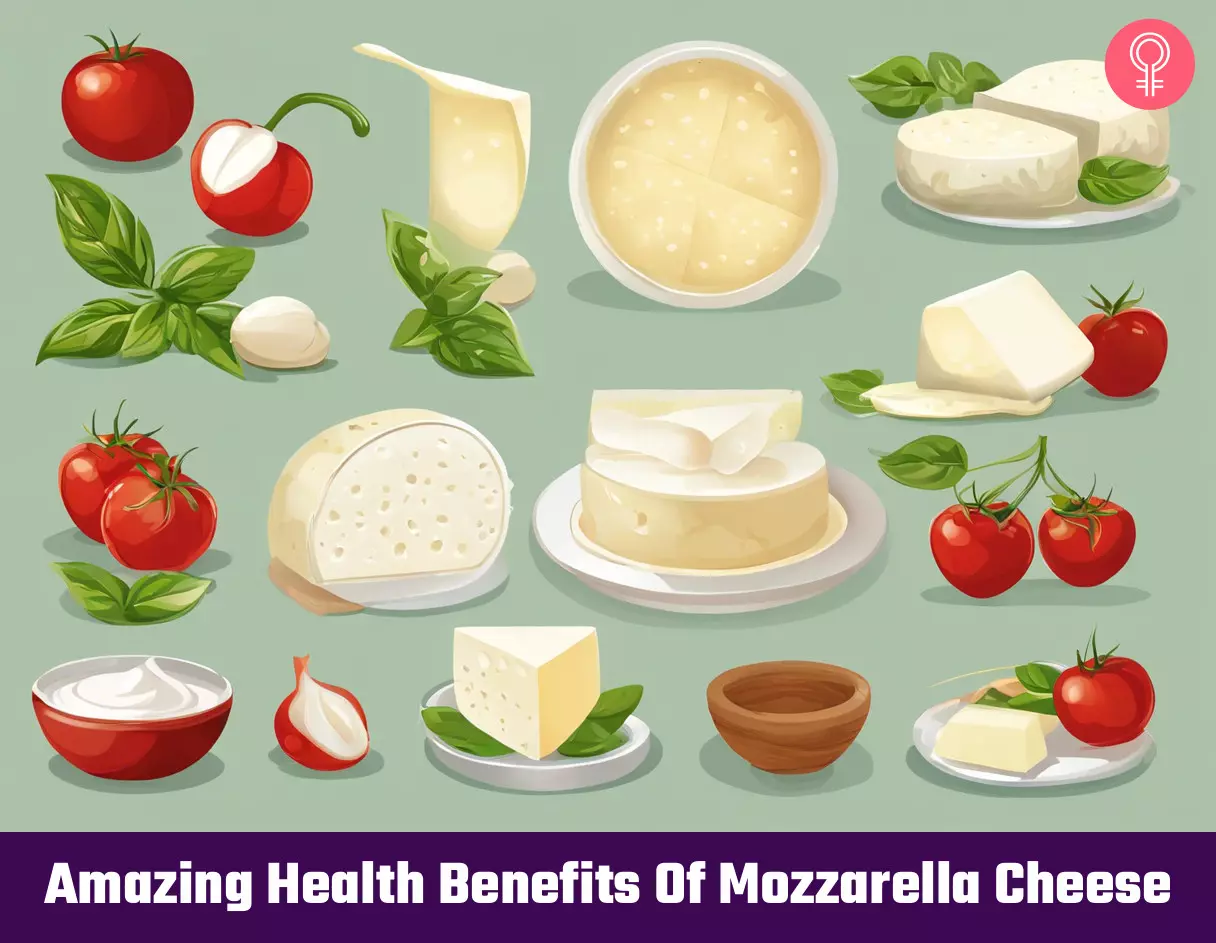Nuances Of Mozzarella Cheese
Cheese benefits go beyond its amazing taste and are not limited to just one type. Cheese, in general, can be a great source of vitamins and minerals that support a healthy lifestyle. This great-tasting staple is loved for its amazingly luxurious flavor and smooth and soft texture that melts so easily. It is made by mixing cow or buffalo milk with rennet, an enzyme. It is turned into curd and then heating and stretching makes it reach a bouncy consistency. Processed mozzarella cheese is available in variants like part-skim milk and whole milk. This cheese variant is best known for its use on pizzas. It is sold in shreds, sticks and slices. What Are Its Benefits? It strengthens bones and muscles, aids weight loss, and improves skin, hair, and nail health. Who Can Consume It? All except those who are lactose intolerant. How Often? Up to 42 g every day. Caution Those who are lactose intolerant should not consume it.
Rahul Panchal, a blogger, shared his love for the fresh and milky flavor of mozzarella cheese, despite his distaste for fresh milk. He adds in one of his blog posts, “While most of us appreciate mozzarella in its melted form, I also absolutely adore delicious bocconcini, little balls of fresh mozzarella tossed together in a simple salad with summer heirloom tomatoes, fresh basil leaves, and [a] light vinaigrette of sticky, sweet balsamic vinegar, and fruity extra virgin olive oil… (i).”
Health Benefits Of Mozzarella Cheese
Made from milk, Mozzarella cheese is just more than its taste and calories. Other than calcium, this cheese variant offers a variety of health benefits. A 28g serving of mozzarella cheese typically provides about 85 calories, 6g of protein, 6g of fat, and 143mg of calcium (1). These numbers highlight its importance as a nutritious part of a well-rounded diet. Renato Fernandes, a clinical nutritionist, says, “Mozzarella cheese is not a bad food at all. It is packed with protein, calcium, and phosphorus – things that will keep you strong and energetic and help to maintain healthy bones and muscles. It has a little vitamin A and D in there, plus a few B vitamins for skin health, the immune system, and energy metabolism.” Read our guide to see how your favorite cheese rates on the nutrition meter.
1. Source Of Biotin
Mozzarella cheese is a fine source of Biotin also called Vitamin B7. Since this nutrient is water soluble, the body does not store it. Eating this cheese variant can thus satisfy your immediate nutritional needs. Pregnant women can eat cheese to cope with possible biotin deficiency (2). This vitamin also stops nails from turning brittle. Studies have shown biotin can also lower blood glucose levels in diabetic people. It also helps in promoting the health of the hair, skin, and nails.
2. Source Of Riboflavin
It is a good idea to eat mozzarella cheese as it is rich in Vitamin B2 or riboflavini Vitamin B complex that is yellow and present in many foods, including milk, liver, eggs, and green vegetables. . Part of the vitamin B complex family, it needs to be taken daily as it helps the body fight various ailments and conditions like migraine attacks and anemia (3). It also has proven antioxidant properties.
3. Source Of Niacin
The dairy product also contains vitamin B3 or Niacin, which plays a pivotal role in turning fat into suitable energy in the human body (4). Besides, Niacin helps control cholesterol, prevents the onset of ailments like diabetes and arthritis.
4. Source Of Protein
One of the best benefits of mozzarella cheese is that it is a powerhouse of protein. If you want a source of protein, mozzarella cheese makes a good choice. Eating this cheese keeps you energetic and boosts muscle strength.
5. Replete With Fat Soluble Vitamins
Mozzarella cheese also contains important fat-soluble vitamins like D, E and A (5). These vitamins are required for calcium absorption, bone health and cell membrane protection.
6. Helps Make Bones Stronger
The cheese variant contains a high amount of Calcium-a key mineral that is required for optimum bone and teeth health. One ounce of mozzarella cheese has 183 milligrams of calcium. Thus, it may help protect tooth enamel and maintain bone structure (6). Besides, it plays a pivotal role in safeguarding heart muscles and reduces risk of colon cancer. It may also support weight management.
7. Good Source Of Phosphorus
Mozzarella cheese has a fair amount of phosphorus, which helps the human body absorb calcium from foods. It is also required for optimum digestion and proper functioning of the kidneys. The mineral helps fight muscle fatigue and facilitates brain functioning. Fernandes also has similar views. He says, “Mozzarella can be quite helpful in that department, potentially, because the cheese is full of important nutrients such as vitamin B12, a very important vitamin for brain health and also for helping your neurotransmitters do their job – if you’re not getting enough B12, one study reports, this can increase the risk for brain shrinkage and neurodegenerative diseases as your age.”
8. Replete With Zinc
Zinc is a vital mineral present in Mozzarella cheese (6). Zinc helps battle skin problems and increases white blood cell count. It also helps the prostate gland function well and aids in shedding excess weight.
9. Source Of Potassium
Potassium is another key mineral that is found in this cheese (7). Potassium helps battle the adverse effects caused by sodium consumption in humans. Potassium also aids in lowering blood pressure and rectifying abysmal heart rhythms. Incorporating mozzarella cheese into your diet can be simple. The following recipe would be a good starting point. Incorporating mozzarella cheese into your diet can be simple. Keep reading to learn how.
How To Incorporate Mozzarella Cheese Into Your Diet
Add mozzarella to salads for extra flavor and protein. Use mozzarella in sandwiches or wraps for a creamy texture. Use shredded mozzarella on pasta or pizza for a delicious cheesy touch. Include mozzarella in omelets or scrambled eggs for added richness. Try making a Caprese salad with mozzarella, tomatoes, and basil for a fresh, light meal. Use mozzarella as a topping for baked dishes like casseroles or stuffed vegetables.
The following recipe would be a good starting point.
Mozzarella Cheese Recipe
Mozzarella Cheese Sticks
Ingredients
10 to 12 Mozzarella cheese sticks 1 cup of all-purpose flour 2 eggs, beaten 1 cup of breadcrumbs 1 teaspoon of Italian seasoning ½ teaspoon of garlic powder Salt and pepper, to taste Oil, as needed Marinara sauce
Instructions
A Word Of Caution
Without doubt, mozzarella cheese tastes great but at the same time it is replete with vital nutrients. But the bad news is it contains high amounts of saturated fat which can be a concern for cardiovascular health and weight issues. It is advisable to take this dairy product in moderation and go for low-fat variants. How does mozzarella cheese compare to other types of cheese in terms of its protein content? “Depending on its cut and type, mozzarella is pretty average on the protein front when compared with other cheeses,” says Renato Fernandes. He further adds, “Hard cheeses such as Parmesan have more protein per gram than mozzarella, as do softer cow and goat cheeses such as Brie or Camembert, but not by much. So it’s a pretty good way of increasing your protein intake at lunch and dinner, which is helpful for repairing and growing your muscles.” Can I eat mozzarella before bed? Yes, it is safe to eat mozzarella cheese before bed. It is said to improve sleep quality and help you sleep longer. Is mozzarella cheese high in fat? No, mozzarella cheese is comparatively low in fat than other types of cheese. Hence, it is considered a healthy substitute for other cheeses. Is it good to eat mozzarella every day? No, it is not good to eat mozzarella every day as it is high in calories. While it is rich in nutrients, a cup of shredded whole-milk mozzarella cheese contains 335 kcal (1). If you eat it every day, ensure to have it in moderation. Is mozzarella healthier than paneer? No, mozzarella is not healthier than paneer. Though both are derived from cow’s milk, 100g of mozzarella cheese has 299 kcal (1), while 100g of cottage cheese has 98 kcal (8). Further, mozzarella also contains high amounts of saturated fat and cholesterol compared to paneer. Is mozzarella cheese a good choice for people who are lactose intolerant or have other dairy allergies or sensitivities? No, mozzarella cheese is not a good choice for people who are lactose intolerant or have other dairy allergies or sensitivities, as it is made from cow or buffalo milk that contains lactose. However, anecdotal evidence suggests that some people with lactose intolerance may tolerate hard cheeses like mozzarella, which are low in lactose. However, there are no relevant studies to support this claim.
Illustration: Amazing Health Benefits Of Mozzarella Cheese
Mozzarella cheese is packed with several beneficial nutrients and health benefits. Check out the video to understand why you should add this creamy and delicious dairy product to your diet.











![]()

